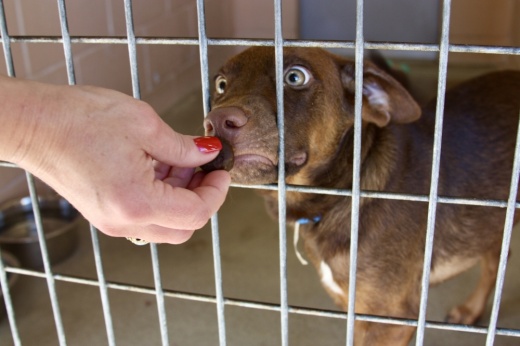Residents have shared concerns about animals sourced from commercial breeders, specifically regarding the recently opened Puppyland store, and the potential effects of not regulating animal sales, said Christopher Looney, planning and development services director for the city.
City Council members made a recommendation in October to the New Braunfels Animal Advisory Board to discuss options for an ordinance to address commercial animal sales.
Though the city does have ordinances relating to the humane treatment of animals, this is the first ordinance to be discussed that deals with the local sale of animals and their sourcing, Looney said.
During a Dec. 16 meeting, board members examined three options regarding where and how commercial animal establishments could source their animals.
City staff reviewed similar ordinances in other cities in Texas when drafting the options, Looney said, one of which was an ordinance passed by the city of San Antonio in October 2020 that banned the commercial sale of pets within city limits.
Independent breeders who sell directly to the public are not affected by the ordinance.
The first option presented in New Braunfels would allow the sale of animals obtained from animal shelters, nonprofit groups, United States Department of Agriculture-licensed breeders or Texas-licensed breeders.
The second option would only allow the sale of animals from animal shelters and nonprofit groups, while the third option would permit the sale of animals from shelters, nonprofit groups and Texas licensed breeders. Stacy Sutton Kerby, director of government relations for the Texas Humane Legislation Network, said it would be against interstate commerce laws to prohibit the sale of animals from outside the state, making the third option not viable.
During the meeting, board members decided to table their discussion to conduct further research regarding the licensing requirements before recommending an ordinance to City Council, said Sarah Hammond, director of the Humane Society of the New Braunfels Area and member of the animal advisory board.
“The Puppyland owners are still standing by their belief that they’re doing this right, that they’re working with good breeders and that they are inspecting these breeding operations. ... I don’t know if it’s true or not,” Hammond said. “Regardless, the way the ordinance is right now, it would allow someone else who is not doing it correctly to come into our town.”
Many have questioned whether a USDA license assures that a breeding operation is humane, Kerby said, and inspections of licensed facilities have declined in recent years, due in part to the ongoing coronavirus pandemic and other factors.
A June 2021 report from the USDA’s Office of Inspector General found that the Animal and Plant Health Inspection Service, the federal organization responsible for enforcing requirements for breeders, experienced data reliability issues and did not have a documented process for responding to complaints against breeding facilities.
“The unfortunate reality is that everybody agrees that the USDA standards are not up to par,” said Albert Sardinas, a representative of Justin and Kayla Kerr, the owners of Puppyland. “[The Kerrs] have additional standards that go above and beyond the USDA standards.”
Sardinas said the Kerrs only source animals from USDA-licensed breeders that have not had any violations of USDA standards, regularly visit their breeders to inspect their facilities and conduct regular health testing on parent dogs and puppies.
“When you put a ban in place, you drive the industry underground. There’s no longer any regulation,” Sardinas said. “None of the options that were discussed are a viable option ... any of those options that were put forward would put them out of business.”
Sardinas and the Kerrs have proposed the implementation of a “pet lemon law” and a “pet sourcing law” to take the place of a ban on the sale of commercially bred animals.
Lemon laws require stores to cover the costs if an animal they sold becomes sick or is diagnosed with a congenital disease, while pet sourcing laws would limit stores to selling animals obtained from a USDA-licensed Class A breeder, a Class B broker or a USDA-exempted breeder that has four or fewer breeding females.
The New Braunfels advisory board is expected to meet in February to continue discussions and finalize a recommendation for the city. Then council will hold a public hearing and consider an enforcement plan, Looney said.
In 2021, the HSNBA received 500 more animals than in 2020, Hammond said.
“There are plenty of animals in this community that need homes,” she said. “There’s just no reason to be importing hundreds of dogs from other states into this community and selling them for exorbitant prices.”






